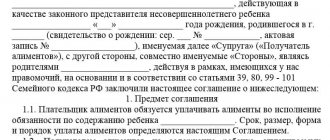Extension of disability for a child who turns 18 years old
If you have special needs, additional funds are required. They are aimed at treatment and recovery. It should be noted that responsibility for an adult child should in no case rest with only one of the parents.
If a father or mother refuses to provide financial assistance to their own child, then alimony funds must be demanded in the manner prescribed by current legislation.
In this article you can learn about when re-examination of a disabled child after 18 years is not required. Every parent raising a son or daughter with special needs knows that he or she is not assigned a disability group until he or she reaches adulthood.
As a rule, in this case a general category is simply established - a disabled child. Until the age of eighteen, a child can count on the maximum social pension due to the presence of special needs . It is the same as with the first group.
When the child turns eighteen, this status is lost. Consequently, he needs to undergo re-examination at an adult ITU. In this institution, the group and the degree of restriction will be determined and established.
It turns out that a child with disabilities, upon reaching eighteen years of age and receiving the third group, sharply loses exactly two times in pension payments.
It is important to note that the third group is the first, which implies restrictions on labor . In most cases, it does not have significant restrictions. People included in it can be employed. In this case, it should be noted that a transition from a social pension to a labor pension for disability is expected.
The right to a labor pension due to the presence of the third group does not depend on the length of the insurance period. It may be small. Even one day of such experience is enough. This does not mean that the insurance period does not affect the future pension. The amount of government payments depends on its duration.
The pension of a person who has just started performing his work duties and a person who has been working in the same position for five years will differ in the amount of money.
For this reason, parents of a child with disabilities should take care in advance that their eighteen-year-old child, when starting work, can count on a good amount of retirement pension.
To do this, they should consider paying insurance premiums on a purely voluntary basis. This must be done from the moment the child turns fourteen years old.
It is important to note that five years of payment of such contributions equals five years of insurance experience. Thus, you can provide your child with a disability pension. In terms of size, such material payments are much more noticeable than social ones. The latter type of assistance is prescribed to disabled people in the absence of any insurance coverage.
It is greater for those people who are just starting to work. In addition to pension payments, parents of such children need to know that when determining adult disability, close attention is not paid to the diagnosis.
Attention is paid to the extent to which the main types of impairments in the functionality of the body limit a young person (girl) in the ability to:
- self-service;
- independent movement;
- orientation in space;
- communication with other people;
- control of one's own behavior;
- training in higher educational institutions, colleges;
- labor activity (mental, physical).
At the same time, with a comprehensive assessment of the above criteria, which characterize persistent impairments in the performance of individual human systems and organs, the overall degree of their severity is determined.
Parents also need to understand that the pre-adult MSEs are of great importance:
- regularity of visits to the doctor regarding the profile of the underlying disease that caused the disability;
- use and need for mandatory rehabilitation measures;
- whether treatment for the underlying illness is being used and whether it is effective;
- How often did parents and their child visit the children's health center? This only matters for those persons whose disability was established before the age of eighteen.
When taking care of future adult pension material payments, the mother and father of a particular child should first think about both maintaining the group itself and the insurance period.
Which children are recognized as disabled
Based on Federal Law No. 181 of November 24, 1995, a disabled person is a person who has a permanent impairment of health due to illness, injury or congenital defects and who cannot lead a full social life due to the complete or partial loss of necessary skills.
This provision applies to both adults and children; all of them equally need to undergo a special medical and social examination (MSE) in order to receive the status of a disabled person.
Medical and social examination will need to be repeated every 1, 2 or 5 years, depending on the disease. But there are diseases, for example Down syndrome, in which disability is issued once and for all.
For children under 18 years of age, disabilities are not divided into groups like for adults; they are simply assigned the status of “disabled child.”
Determination of disability usually occurs at the local ITU bureau, but if parents do not agree with the decision of the commission, they can contact a higher authority - the Federal ITU Bureau.
The examination is scheduled within 30 days after filing the application. The commission announces its decision immediately. If the ITU was in absentia, then the decision is sent by mail.
The ITU Commission must not only announce its decision on paper, but also issue a special certificate, with which one must then apply for various payments.
When is re-examination of a disabled child not required after 18 years of age?
A group is assigned to individuals without specifying a specific period for re-examination. But for citizens who have not yet turned eighteen, the category “disabled” remains until adulthood.
The establishment of a group without specifying a specific period for re-examination can be carried out upon initial recognition of a citizen as disabled. This is only possible if there are no positive changes after completing mandatory rehabilitation measures.
Who can receive payments for disabled children
Not only his parents, but also any other legal representatives, for example, grandparents, other relatives, guardians, and trustees can receive all the required payments and benefits for a disabled child.
When applying for benefits, it will be enough to attach to the list of required documents the child’s birth or adoption certificate, or another document confirming the fact of relationship. For example, grandparents must additionally attach the birth certificate of their child, that is, the father or mother of a disabled child.
Types of disability
Types of disability are the following:
- persons using wheelchairs;
- people who have serious musculoskeletal disorders;
- citizens with serious vision problems;
- disabled people suffering from diseases that negatively affect the ability to hear;
- people who have serious intellectual disabilities.
There are also three disability groups: first, second and third.
It should be noted that persons with disability groups 3 and 2 are classified as working citizens. But people in the first group cannot work due to poor health.
Dear readers! To solve your problem right now, get a free consultation
— contact the on-duty lawyer in the online chat on the right or call:
+7
— Moscow and region.
+7
— St. Petersburg and region.
8
- Other regions of the Russian Federation
You will not need to waste your time and nerves
- an experienced lawyer will take care of solving all your problems!
Benefits for disabled children and their parents
In addition to financial assistance, families with disabled children are entitled to various benefits, for example, a tax deduction for working parents or preferences for children when enrolling in universities.
Such families receive land plots as a matter of priority, if such is provided in the region. Let's consider such cases in more detail.
Tax deduction for parents
According to Article 218 of the Tax Code of the Russian Federation, parents and guardians of a disabled child are entitled to tax deductions, and in an increased amount.
- parent in the amount of 12,000 rubles;
- adoptive parents and guardians - 6,000 rubles.
Moreover, this tax deduction comes in addition to the usual deduction for children, which is equal to 1,400 rubles for the first and second children and 3,000 rubles for the third and subsequent children. This decision was made by the Presidium of the Supreme Court of the Russian Federation.
We recommend that you study the detailed article about tax deductions on our website.
Benefits for disabled children when entering a university
Disabled children have a priority right to enroll in a university.
In different universities, the conditions for enrolling children with disabilities differ and admission is possible according to one of 3 options:
- enrollment without entrance exams;
- enrollment after passing exams;
- priority enrollment. If, for example, two students have the same entrance scores, preference is given to the disabled student.
The benefit for entering a university is provided only once.
Law on assigning disability to children in 2021
The legal status of disabled children and the families in which they are kept is regulated by:
- Federal Law No. 181 “On social protection of disabled people in the Russian Federation”;
- Decree of the Government of the Russian Federation No. 95 “On the procedure and conditions for recognizing a person as disabled”;
- Order of the Ministry of Labor and Social Protection of the Russian Federation No. 1024n.
These documents regulate the issues of assigning the status of “disabled child”, the procedure for its registration, criteria for assignment and benefits.
How to apply for disability for a child
A child can be assigned a disability based on a medical and social examination.
The medical institution observing the patient can initiate the procedure. For this purpose, the parent of the sick child is given a referral to medical examination in the prescribed form. The referral describes the child’s health status, anamnesis, life history, and biometric data. A medical organization can refer a child for medical examination only after he has undergone a full examination.
If a medical institution refuses to issue a referral for medical examination, the parent can also initiate the child’s examination. To do this, you should contact the ITU Bureau with an application. Medical staff will independently conduct an initial examination of the child, assess his condition and refer him for additional tests or studies.
Note!
The examination is carried out at the office at the child’s place of residence. The examination can be organized at home or in the hospital where the child is kept if he cannot be taken to the office for health reasons. It is also possible to carry out an examination in absentia, which consists of assessing the child’s documents without direct examination.
The decision to conduct an on-site or correspondence examination is made individually, depending on the circumstances of the child’s life and health.
Deadlines for registration of disability
A child can be assigned a disability for one year, two years, five years, up to fourteen years, and without a specific period - up to eighteen years.
Documents required for registration of disability
To conduct MSE you must provide:
- a referral issued by the medical organization where the child was observed;
- an application for an examination from the child’s parent, the parent’s passport should be attached to the application;
- birth certificate, if the child is under 14, or passport;
- the child’s medical documents: chart, test results, doctors’ reports;
- characteristics of the child from school or kindergarten, if he attends them.
Pension for a disabled foster child
In order for adoptive parents or guardians to receive a pension for a disabled child under their care, they need to contact the Pension Fund of the Russian Federation and provide a standard list of documents plus an order to appoint guardianship or create a foster family.
While the child was in the orphanage, the state paid him a pension, but it went to a special bank account. Guardians and adoptive parents cannot receive this money. Part of the funds can be withdrawn only with the permission of the district guardianship department. You need a good reason for this. For example, payment for urgent treatment, expensive medicine or rehabilitation equipment.
After the child is accepted into the family, the pension is paid to the nominal account of the guardian or adoptive parent. To do this, you need to open a nominal account in any bank and transfer its details to the Pension Fund of the Russian Federation.









